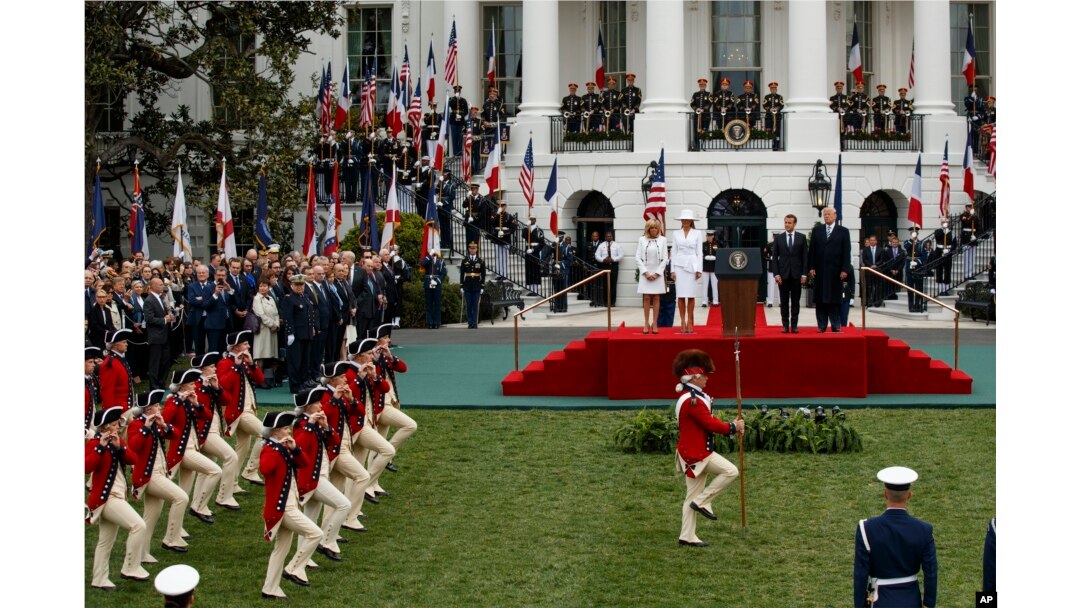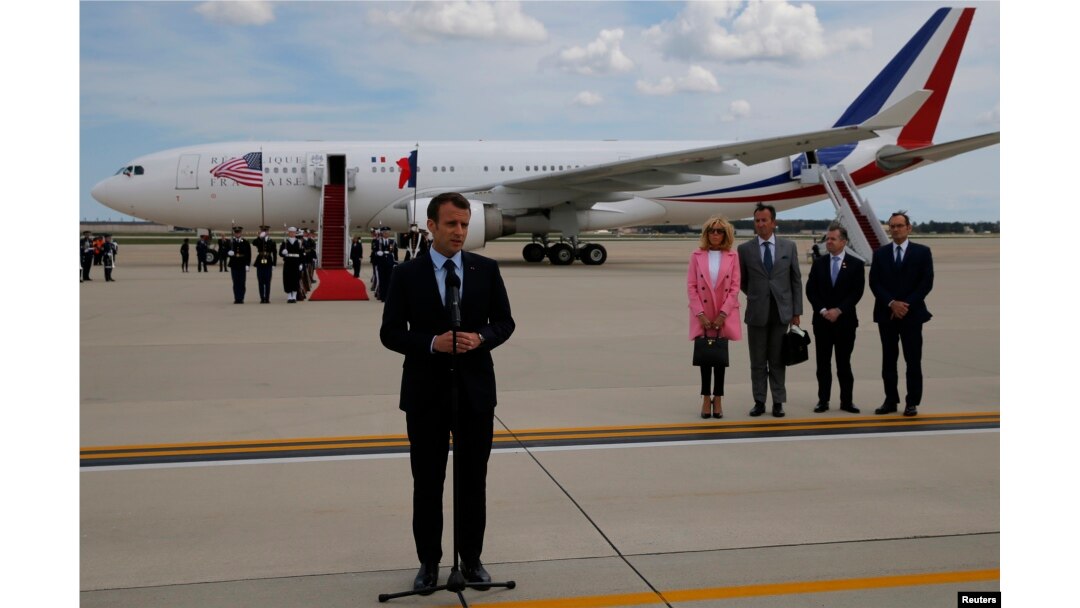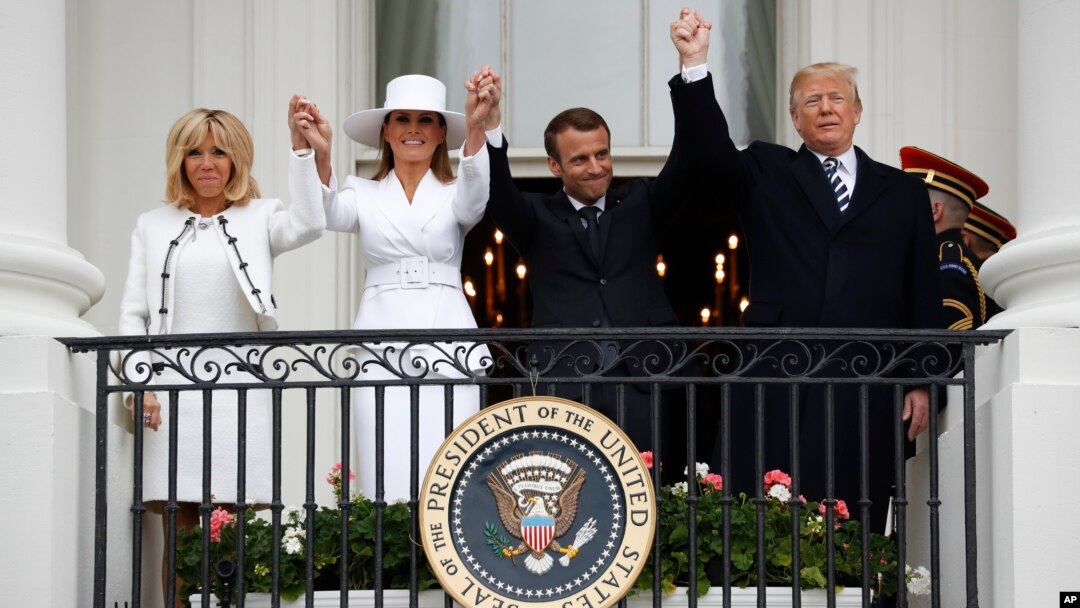U.S. President Donald Trump welcomed French President Emmanuel Macron to the White House on Tuesday with military pageantry, just ahead of talks on world issues where the two leaders disagree.
On a gray Washington morning, Trump celebrated two centuries of friendship and military alliances between the two countries, thanking Macron for joining the U.S. and Britain in a recent missile attack on Syria in response to Damascus's suspected use of chemical weapons .
"Now is the time for strength, so let us be strong, let us be united, let us honor our past and face our future with confidence and with pride," Trump said. "And let the United States and France stand forever in solidarity for the noble cause of liberty and peace."

Brigitte Macron, first lady Melania Trump, French President Emmanuel Macron, and President Donald Trump look on during a State Arrival Ceremony on the South Lawn of the White House, April 24, 2018, in Washington.
Macron, unlike Trump, mentioned several global issues they planned to discuss in their private talks, the threat of global terrorism, North Korea's nuclear weapons development and the 2015 international pact restraining Iran's nuclear program.
"It is together that the United States and France will defeat terrorism," Macron said. "It is together we will build a new form of prosperity."

French President Emmanuel Macron speaks to the news media after arriving with his wife Brigitte Macron for their state visit to Washington at Joint Base Andrews in Maryland, April 23, 2018.
Later, as they gathered for talks at the White House, Trump referred to the 2015 Iran nuclear agreement as "terrible deal" while Macron said the pact was "important" and will be a focus of talks.
Trump said, "Iran seems to be behind everything (in the Middle East) where there is a problem. The Iran deal is a disaster. What kind of a deal is it where they're allowed to test missiles."
He said if Iran restarts nuclear testing, "They will have a bigger problem than they've ever had before."
Trump has constantly called the nuclear pact a bad agreement. He faces a May 12 deadline to again waive economic sanctions against Iran as part of the deal. Macron supports the pact and is trying to convince Trump to not abrogate next month.
The two leaders are also discussing other thorny issues where they differ: Trump's stated plan to withdraw U.S. troops from Syria at a time Macron wants a continued U.S. presence, the U.S. leader's intention to withdraw from the Paris climate change agreement and Trump's plan to impose tariffs on aluminum and steel imports that could curtail European exports of the metals.
Trump takes great pride in his friendship with Macron, which is one of the reasons he invited the French president to be his guest for the first state visit of a foreign leader in his administration.
Brigitte Macron holds the shovel after a tree planting as first lady Melania Trump and French President Emmanuel Macron stand on the South Lawn of the White House in Washington, April 23, 2018.
"This visit is very important in our current context, with so many uncertainties, troubles, and at times, threats," Macron said upon arriving in Washington.
Earlier Tuesday, a 21-gun salute echoed across the South Lawn of the White House in a welcoming ceremony that included nearly 500 service members from all five branches of the U.S. military, including a drum and fife corps.
In the evening, Trump and first lady Melania Trump are hosting the first state dinner of the Trump presidency in honor of Macron and his wife, Brigitte Macron, with entertainment by the Washington National Opera.
Meanwhile, Iranian President Hassan Rouhani told supporters Tuesday there would be severe consequences if the United States withdraws from the nuclear agreement.
Benham Ben Taliblu, an Iran analyst with the Foundation for the Defense of Democracies, told VOA that if the United States pulled out, the Iranian reaction would depend on the way in which that happens.
"If the U.S. pulls out with a statement that says the U.S. is abrogating all its commitments under the deal, then I think the Iranians would look to try to try to create some sort of leverage, restart part of their nuclear program, but most importantly the Iranians would sic the Europeans and the international community on America and try to isolate America," he said.
Macron has said he knows the deal with Iran is not perfect but said there is no "Plan B."
Trump also has until May 1 to waive tariffs on European steel and aluminum imports or face a possible trade war.
The French president will also likely talk to Trump about what Macron said is the importance of U.S. forces remaining in Syria. Trump has talked about withdrawing Americans from northern Syria. Macron said that would increase the risk of giving up Syria to the regime of Syrian President Bashar al-Assad and Iran.
Macron will address Congress on Wednesday before heading back to Paris.
VOA's Victor Beattie contributed to this story.


